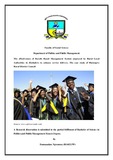Please use this identifier to cite or link to this item:
https://cris.library.msu.ac.zw//handle/11408/3087| Title: | The effectiveness of results based management system employed by rural local authorities in Zimbabwe to enhance service delivery: the case study of Hurungwe Rural District Council. | Authors: | Ngwarura, Emmaculate | Keywords: | Service delivery Results based management system Zimbabwe Rural local athourities |
Issue Date: | 2018 | Publisher: | Midlands State University | Abstract: | Efforts in improving the public sector efficiency and effectiveness can subsequently lead to improved public service delivery by maximising value for money through results based management system which the Zimbabwean Government introduced to all local authorities in 2014 for enhancement of service delivery efficiency as local authorities were deteriorating in terms of service delivery despite the fact that they are planning authorities. . However the results had not been realizes as expected, therefore this study sought to investigate the effectiveness of Results Based Management System employed by Rural Local Authorities in Zimbabwe to enhance service delivery using Hurungwe Rural District Council as a case study through the assessment of the changes brought by the introduction of the concept, the link between Results Based Management and service delivery not forgetting the challenges to the implementation of Results Based Management. Analyses of these factors could help the government and local authorities to identify strategies to improve the system and enhance their quality of service delivery and provide insight into the formulation of future initiative for implementation of other national policies. The secondary data was obtained through study of relevant literature while primary data was obtained through questionnaires and interviews of the targeted Hurungwe Rural District Council officials, ward councillors, business community and the ordinary residents. Questionnaires were given to 10 Hurungwe Rural District Council employees and interviews were done to 25 respondents. Content analysis was employed to identify themes. The findings emerged from the research indicated that there were quite remarkable improvements of water supply, the health sector and traffic ability of roads. However, despite some improvements on the ground, it was also noted that Hurungwe Rural District Council had implementation challenges involving organisational challenges, technical challenges, behavioural challenges, lack of training, fear of the unknown, lack of oneness in planning and implementation of RBM system and also resource constrains to expedite progress of the system thus affecting the effectiveness of the Results Based Management employed to enhance service delivery. Following challenges observed, it was recommended that local authorities should be transparent and accountable in their operations, a right climate must be created and involve everyone into the process even the grass roots staff so that results oriented culture prevails, training to be done regularly so that Councillors would have technical expertise to do evaluation when the need arises and training on council functions to residents would also enable them to appreciate operations of local authorities in general. | URI: | http://hdl.handle.net/11408/3087 |
| Appears in Collections: | Bachelor Of Science In Politics And Public Management Honours Degree |
Files in This Item:
| File | Description | Size | Format | |
|---|---|---|---|---|
| Immaq project.pdf | Full Text | 1.29 MB | Adobe PDF |  View/Open |
Page view(s)
330
checked on Jan 29, 2026
Download(s)
160
checked on Jan 29, 2026
Google ScholarTM
Check
Items in MSUIR are protected by copyright, with all rights reserved, unless otherwise indicated.



